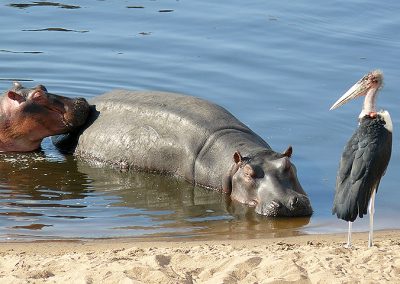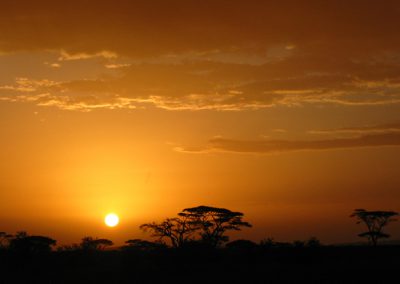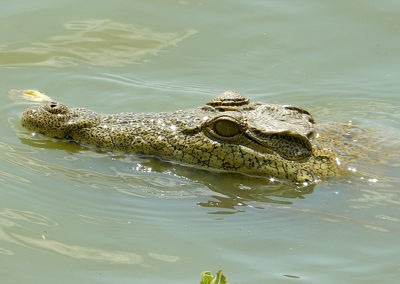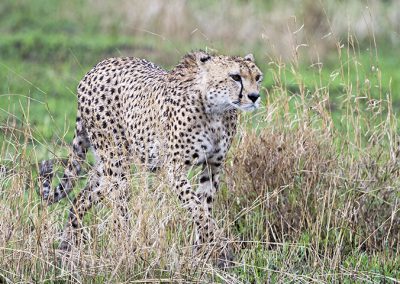From Kilimanjaro to Lake Tanganyika
17 days Fixed Departure Safari from North to South and further on to West Tanzania. HighlightsItinerarySafari Highlights
This adventurous safari takes you to remote wildlife areas with an impressive variety of flora and fauna as well as scenic landscapes. Whether you are travelling with motor boat to Gombe Stream NP for chimpanzee tracking, game viewing in the untouched wild of Katavi NP, hanging out on the shores of Lake Tanganyika or, just hiking in the cooler, fertile Southern Highlands and enjoying a freshly brewed cup of tea straight from one of its’ tea plantations – this safari will keep you on your toes. It’s not for the faint hearted but for those who wish to experience a real safari.
- 16 overnight stays in hotels, guesthouses, lodges and tented camps (simple to mid-range)
- guaranteed departure from 2 persons only
- small group up to max. 7 persons
- 4×4 safari vehicle (Toyota Land Cruiser or similar) with window seat guarantee
- Safari may be combined with Kilimanjaro or Mt Meru climb, safari in South or West Tanzania or, a beach extension
- optional add-on: Serengeti & Ngorongoro Crater
Join this safari
Duration: 17 days
Starts from: Kilimanjaro Airport
Ends at: Mwanza Airport
Extension starts from: Mwanza Airport
Extension ends at: Kilimanjaro Airport
Tour code: FDSCSW
Our day-to-day itinerary
(click on the day to expand)
Day 1: Arrival
Accommodation: African View Lodge or similar. (-/-/D)
Day 2: Tarangire NP
After breakfast, transfer to Tarangire National Park for a game drive. This park which is famous for its gigantic baobab trees and large herds of elephant (some of which have the longest tusks in Tanzania!) is home to many different mammals and birds. The Tarangire River which flows through the park draws the animals to it’s banks especially during the dry season and it’s swamps in the south also provide water and food when times get tough.
Accommodation: Tarangire View Tented Lodge or similar. (B/L/D)
Day 3: Kolo Rock Paintings & Dodoma
The Kondoa Rock Art Sites include over 150 natural caves or shelters that have been used for rock paintings over at least two millennia. The paintings have high artistic quality and were made with a brush-like instrument. They depict elongated people, animals, and hunting scenes. The rock art of Kondoa belongs to the distinct rock art traditions of central and southern Africa.
Accommodation: New Dodoma Hotel. (B/L/-)
Day 4: Ruaha NP
Accommodation: Ruaha Hilltop Lodge or similar. (B/-/D)
Day 5: Ruaha NP
Other noted animals found in this park are cheetah, leopard, lion, African wild dog, giraffe, hippopotamus, buffalo and sable antelope. The rhinoceros population was last sighted in 1982 and are most likely extinct in the park due to poaching.
Accommodation: Ruaha Hilltop Lodge or similar. (B/L/D)
Day 6: Ruaha NP & Southern Highlands
Accommodation: Kisolanza Farm, simple rooms with shared bathroom facilities. (B/L/D)
Day 7: Southern Highlands
It also experiences the highest rainfall in Tanzania for part of the year. Dotted with waterfalls and craters, the Southern Highlands is a ramblers paradise. Today you can enjoy a short walk to the fascinating Kaporogwe Waterfall.
Accommodation: Hotel in Tukuyu. (B/-/-)
Day 8: Southern Highlands
It can be found near Tukuyu. It is part of the Poroto Ridge and, part of the caldera rim is the highest point of the Ridge and mostly composed from trachytic and phonolitic lavas. Ngozi is a Holocene caldera that generated the Kitulo pumice 12,000 years ago during a Plinian eruption, most likely in the same eruption that generated the caldera.
Accommodation: Utengule Coffee Lodge near Mbeya. (B/-/-)
Day 9 and 10: Lake Tanganyika
The name apparently refers to “Tanganika”, ‘the great lake spreading out like a plain’, or ‘plain-like lake’.
Lake Tanganyika is home to many different and often, endemic fish species (at least 250 species of cichlid fish and 75 species of non-cichlid fish). Day 10: Simply spend the day relaxing on the beach or choose from a variety of optional activities eg. snorkelling, diving, sailing.
Accommodation: 2x Lake Shore Lodge, overnight in bandas (simple bungalows with shared ablutions). (B/-/D)
Day 11: Katavi NP
Accommodation: simple Banda (TANAPA Resthouse). (B/-/D)
Day 12: Katavi NP
Carnivorous animals that roam this park are cheetahs, wild dogs, hyenas, leopards, and lions. Katavi has fewer human visitors and jeeps conducting game drives than other Tanzania parks.
Accommodation: simple Banda (TANAPA Resthouse). (B/L/D)
Day 13: Kigoma
It serves as the capital for the surrounding Kigoma Region and has a population of approx. 140,000 inhabitants and an elevation of 775 m. It is one of the busiest ports on Lake Tanganyika, since historically it was the only one that had a functioning railway connection (the one at Kalemie in DR Congo is not operational), a direct link to the seaport at Dar-es-Salaam. On arrival at the hotel, check in and enjoy an ice cold sundowner or a dip in the pool with stunning views overlooking the lake.
Accommodation: Kigoma Hilltop Hotel or similar. (B/-/-)
Day 14: Gombe NP
Gombe Stream’s high levels of diversity make it an increasingly popular tourist destination. Besides chimpanzees, primates inhabiting Gombe Stream include beachcomber olive baboons, red colobus, red-tailed monkeys, blue monkeys, and vervet monkeys.
Red-tailed monkeys and blue monkeys have also been known to hybridize in the area. The park is also home to over 200 bird species and bushpigs. There are also 11 species of snakes, and occasional hippopotami and leopards. Visitors to the park can trek into the forest to view the chimpanzees, as well as swim and snorkel in Lake Tanganyika with almost 100 kinds of colorful cichlid fish.
Accommodation: TANAPA Resthouse (simple standard). (B/L/D)
Day 15: Gombe NP & Kigoma
Accommodation: Kigoma Hilltop Hotel or similar. (B/-/-)
Day 16: Mwanza
Accommodation: Tilapia Hotel. (B/-/-)
Day 17: Departure
Optional extension program
Day 17 and 18: Serengeti NP
During the game drives in the park you are most likely to see elephants, buffaloes, giraffes, ostriches and many other species and, with a little luck, cheetahs hunting or even a dozing leopard lying in the fork of a tree. Along the sand banks of the rivers, crocodiles can be seen sunning themselves whilst the depths of the waters are closely guarded by pods of tightly-packed hippos.
Accommodation: 2x Serengeti View Tented Camp or similar. (B/L/D)
Day 19: Ngorongoro Crater
These animals all share an area of only 260 km² with numerous wildebeest, various antelopes, zebras and many other East African mammals.
Accommodation: Endoro Lodge in Karatu or similar. (B/L/D)
Day 20: Arusha
Accommodation: African View Lodge or similar. (B/L/D)
Day 21: Departure
Requirements
Team spirit and willingness to forgo comfort during long drives in non-acclimatized safari cars on badly-maintained roads and tracks is necessary. Sure-footedness, a good fitness level, and the ability to cope with different climates especially for the chimpanzee tracking and the walking trips are a plus. It is not absolutely necessary to participate in the individual walks as they are day trips or short walks. Certain types of accommodation are of a very basic standard and only offer shared toilets/showers.








